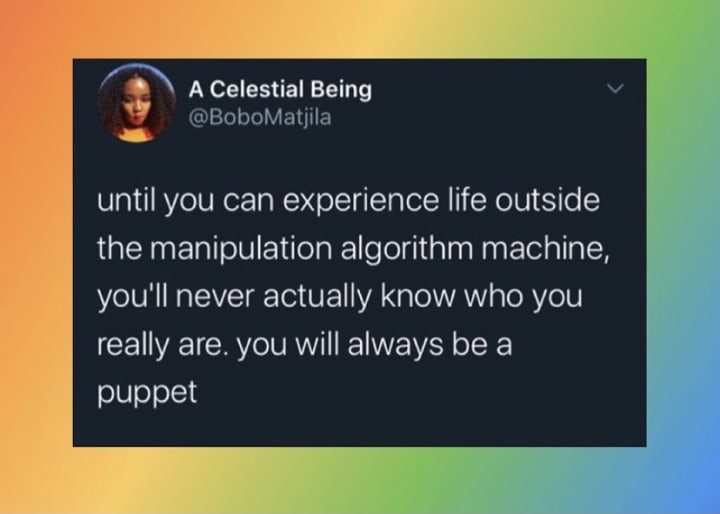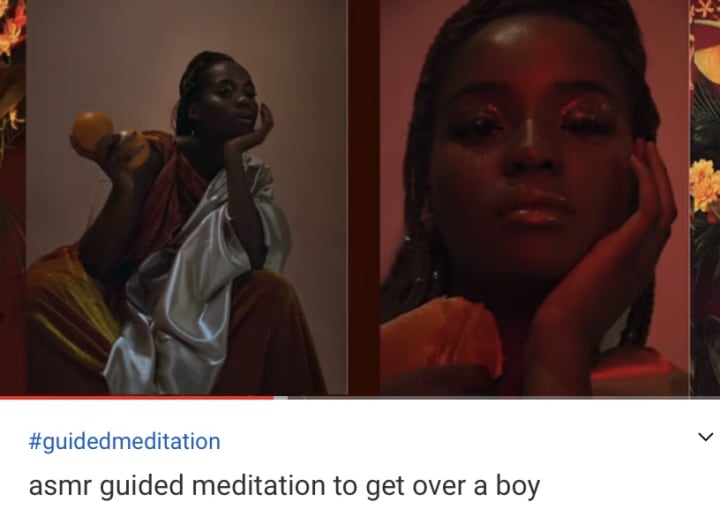Bobo Matjila, your favourite African philosopher
A jellyfish doesn’t dream of labour

Bobo, my favourite ‘jellyfish’ disguised as a human ‘bean’, a self proclaimed alien, a prophet and a puppy owner to Marshmallow.
Bobo is the co-host of the popular podcast Bobo and Flex and has her own podcast titled, Bobo’s Void where she talks about philosophy, the burden of existence, self worth, sex, love, and boys with dirty fingernails.
Don’t try to debate with Bobo about finances, she has a degree in economics, she’s been a model, she has worked in the fashion industry, started a patreon, she is currently running a book club and is teaching people how to cook delicious recipes which will appear in her soon-to-be released cooking and philosophy book.
Lastly Bobo, amongst many other things, doesn’t dream of labour.

There are many reasons why I admire Bobo Matjila and I would love you, the reader, to learn about Bobo through your own lens.
First, She gave me the power to discover who I am.
Free will or no free will? This was my dilemma. For years, I kept wondering whether I had to follow a prewritten destiny or if I had the opportunity to choose who I am, my career, my lifestyle and even smaller things such as my body odour or my fashion style. Was I a puppet? And was Karl Marx right when saying that my behaviour is controlled by the structure I was born in?
These thoughts stemmed from my belief that I had to be one thing, that I had to fit into a box and reduce myself to what society expected me, a black woman, to be. I wanted to be a stylist but I also liked writing so I tried to pick one. I wanted to be a traveller but I also wanted to live in my native country, Italy. I want to be a filmmaker but I also like acting, fashion, reading, philosophy, sports and making money. How could I possibly pick just one?

Bobo once said that we do have free will. We are one decision away from having a completely different career, gender and/or lifestyle. Ultimately, we need to just make a choice and if we feel stuck, it is probably because we have been running in circles and not moving forward. I wrote that advice in my self help book and started making my own choices and building my own identity based on who I wanted to be and not who I was previously or who I was told to be.
One thing that I learned from Bobo is that we sometimes remain prisoners of our past decisions and we don’t allow ourselves to change. Existence precedes essence.

Bobo often mentions the french philosopher Sartre, who believes we are not born with a predetermined identity. By mentioning this school of thought, she gave me the power and courage to change, without feeling like I was disappointing someone. In fact, Bobo herself is constantly changing.
To Bobo, one day she’s a human; one day a jellyfish; one day an undercover alien and in the near future, she might just become a mermaid. Bobo believes that we have attached ourselves to our old version and now we’re scared of creating a new self.
She really pushed me to cook better food which is a goal I achieved in the beginning of the year.
She often talks about the importance of eating good food because, to Bobo, it is one of the only ways we can handle difficult situations. Came back from school stressed? Eat delicious ramen. Just had an argument with your significant other? Eat a hot plate of pasta.
Why is she different despite considering herself a regular human ‘bean’?
She talks about suffering in a world that sells toxic and imposed positivity. In her podcast episodes, she talks about human suffering and how it is a consistent part of the human condition and why it should be accepted.
To Bobo, we don’t have to be attached to our pain; this is not at all a way to live. We should just accept that pain as part of the human experience, that should not limit our joy, our desire to live, our relationships and careers.
The same way positivity can be toxic, negativity also can be. As Bobo once said, ‘attachment to pain is so much more comfortable than the liberation you are seeking. So you would rather sink in your suffering and trauma because that is how you created your identity’.

Many people are unable to live a joyful life as they believe that there is nothing to enjoy. However, that’s not the truth at all. Pain exists, we experience grief, we lose people, we fall out of love and we suffer from diseases. This is all part of the reality and despite her talking many times about her sufferance, Bobo is still experiencing the full spectrum of existence.
Bobo often talks about how she is not compatible with capitalism. In a capitalist society, we either belong to the one percent, aka the billionaires or we belong to the dominant majority who are exploited by the one percent. The lack of choice can lead to human suffering and the ones who are unable to exploit have to find alternative sources of income. Bobo is the perfect example of someone who is slowly opting out of capitalism.

Having a patreon is an amazing way to gain money outside of the Instagram algorithm. You can decide what to post, build your own audience and have direct conversations with followers and supporters. People who are willing to open their wallets will have access to more information, discussions and advice from Bobo. For instance, Bobo’s Void is divided into two parts, the first one available on Spotify and the second one only available on Patreon.
Having a patron is also an amazing way to talk about philosophy in a world where philosophy is attached to whiteness and black philosophers are often excluded from the conversation, despite a lot of the philosophical concepts originating from Africa.
This opened my eyes regarding the truth behind social media and its own attachment to whiteness.

Instagram’s algorithm is a social construct. Computers are designed by humans to follow specific instructions and if the algorithm says ‘straight hair’, straight hair will get the likes. Likes means money and money pays the bills. There is no big conspiracy, no mistakes and no secret to be uncovered. Proximity to whiteness is what will allow black people to ‘thrive’ on Instagram.
As a black woman. I always had self worth. I was told that I am worthy, that I deserve respect and that I was like everyone else. I always considered myself pretty, however, if I was pretty, why was I not receiving the same attention that other girls are receiving? But the real question is, why did I want attention in the first place?

Bobo speaks a lot about how the media buys black women self worth by sexualising them. When we talk about black women’s liberation, the conversation is often about how desirable we are and on how many likes we can get on a platform that was not designed for us. The ones who gain popularity on the platform are the ones who are praised.
One example, the beauty pageant world. For the first time in 2019, Miss Universe, Miss World, Miss USA, Miss Teen USA and Miss America were all black women. Despite the world celebrating this win, we cannot help but question whether their success and popularity was a result of their natural beauty and talent or their proximity to whiteness and the desirability of a white patriarchal institution.
Often, the amazing qualities of black women are not appreciated. In fact, they are often demonised. Bobo is an example. Her philosophical conversations, her school of thought and her simple narration of her experience is often seen as a controversial act, as it doesn’t conform to mainstream media or what society expects from black women.
My point is that Bobo doesn't live a life according to societal standards.
She mutates as she sheds her skin to become a new person and is aware that there is no need to search for a purpose in life, when the point of existing is simply living.

Dear reader, I encourage you to join Bobo’s Void and let me know if you wish to dive deeper into concepts such as ‘alien’ or ‘jellyfish’ identity. Leave a like or a tip if you’d like to know more about African philosophy and the woman perspective.
About the Creator
Alessia Mavakala
Hey, I'm a filmmaker and I also love acting. Writing is my passion. I love interior design, good food and I believe self care is a form of art.






Comments
There are no comments for this story
Be the first to respond and start the conversation.